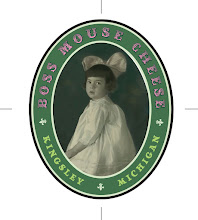I choose not to artificially heat or light my hens throughout the Winter months. There are varied schools of thought on this matter: temperatures in Northwest Michigan can fall well below freezing, and while chickens (like dogs or cats) are "made" to live outdoors and have suitable feathers to clothe them, they also live a domesticated lifestyle and have never spent a night out of doors. Chickens are often artificially lit 24 hours a day to increase egg production, on both large and small scale farms. I believe chickens need the rhythm of day and night just as other creatures do, and while their egg production wains a bit during the Winter, it doubles in the Spring if they have not been exposed to 24 hour "light" all Winter. While I do not heat their coop, they are locked up at night in the 1' foot thick stone walled barn, completely protected from drafts and predators. A few of the girls had a little frost bite on their combs, which you remedy by rubbing Vaseline on them. I do this weekly, and have had no more problems. Like ourselves, their best heat source is food, and as they can't free range like they do in the warmer months, I supplement their diet with a variety of nutritious extras: fresh greens, grains, olive and hemp oil - highly caloric and fat producing, which keep the girls warm and their eggs rich.

Goldie enjoying an oatmeal + peanut butter glob




No comments:
Post a Comment